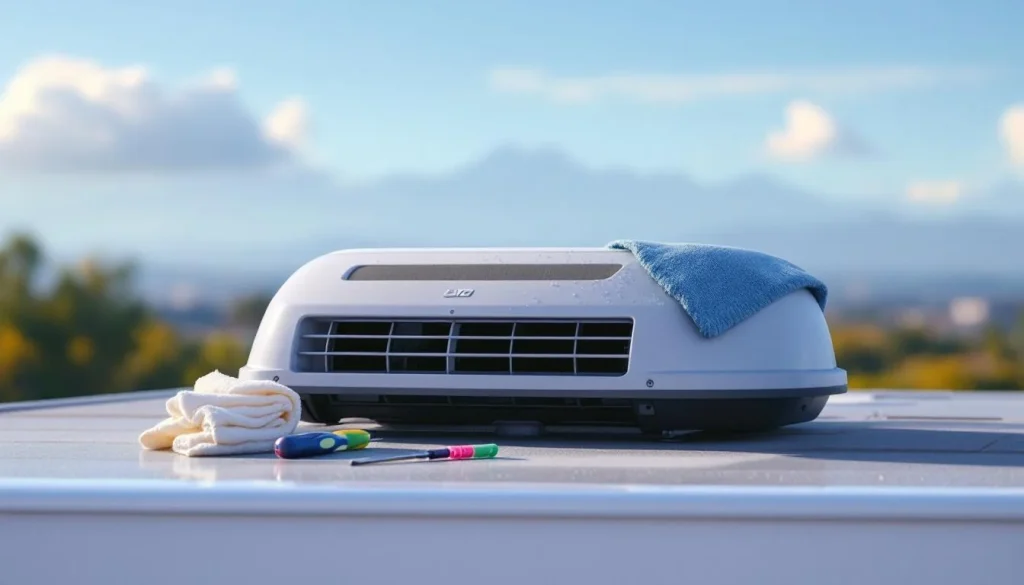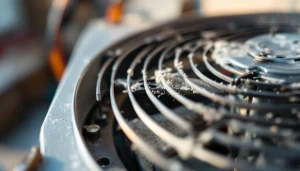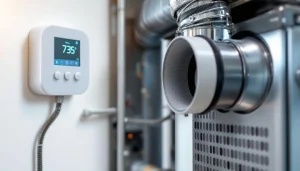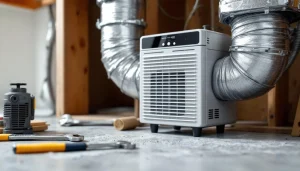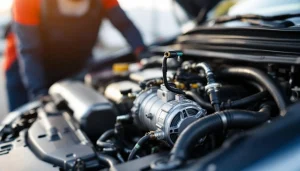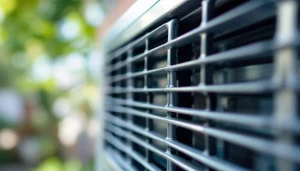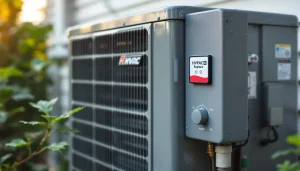At Klein Cooling, we understand the importance of a well-functioning RV air conditioning system for your comfort on the road.
Regular RV air conditioning service is essential to keep your system running smoothly and efficiently. In this guide, we’ll walk you through the steps to maintain and troubleshoot your RV’s AC unit.
Whether you’re a seasoned RV enthusiast or a newcomer to the world of mobile living, these tips will help you keep your cool during your travels.
What’s Inside Your RV Air Conditioner?
The Core Components of Your RV’s Cooling System
Your RV’s air conditioner consists of several key parts that work together to keep you cool. The compressor acts as the heart of the system. It pressurizes the refrigerant, transforming it from a gas to a liquid. This process is essential for heat transfer. The condenser coils then release this heat outside your RV. The expansion valve allows the refrigerant to expand quickly, which cools it down. Finally, the evaporator coils absorb heat from inside your RV, cooling the air that’s blown into your living space.
The Cooling Cycle: How Your RV AC Operates
Your RV’s air conditioner operates on a cycle of compression and expansion. The refrigerant moves through the system, changing from a gas to a liquid and back again. This cycle removes heat from inside your RV and expels it outside. The blower fan then circulates the cooled air throughout your RV’s interior (this process repeats continuously while your AC is running).

Common RV AC Issues to Watch For
RV AC problems can range from minor inconveniences to major malfunctions. Here are some issues we often encounter:
- Frozen evaporator coils: This problem often results from low refrigerant levels or restricted airflow.
- Dirty condenser coils: These can significantly reduce cooling efficiency.
- Electrical problems: Faulty capacitors or control boards can cause the entire system to fail.
- Leaks: These can occur in the refrigerant lines or around the unit’s base, potentially causing water damage to your RV’s interior.
Regular inspections can catch these issues early, which can save you from costly repairs down the road.
The Importance of Understanding Your RV AC
Knowledge of your RV’s AC components and processes will help you maintain the system more effectively. You’ll be better equipped to spot potential problems before they escalate, and you might even be able to perform some basic maintenance tasks yourself (always consult your RV’s manual before attempting any repairs).
Now that you understand the basics of your RV’s air conditioning system, let’s move on to specific maintenance tasks you can perform to keep your RV cool and comfortable on all your adventures.
How to Keep Your RV AC Running Smoothly
Clean Your Filters Regularly
The first step in maintaining your RV’s AC is to clean or replace the air filters. Dirty filters restrict airflow, forcing your AC to work harder and less efficiently. Clean your AC filter and evaporator at the beginning and end of each season, and periodically during use. To clean, remove the filter and wash it gently with warm, soapy water. Let it dry completely before reinstalling. Replace damaged or old filters promptly.
Maintain Your Coils
Condenser and evaporator coils are vital components of your AC system. These coils can collect dirt and debris over time, reducing their efficiency. To clean them:

Monitor Refrigerant Levels
Low refrigerant levels can cause your AC to work inefficiently or even fail completely. However, checking and refilling refrigerant requires specialized equipment and knowledge. A system low on charge will typically have low suction pressure, high superheat, low liquid pressure, and low subcooling, assuming your coils are clean. If you suspect your refrigerant levels are low, contact a professional. They have the expertise to safely handle refrigerants and ensure your system is properly charged.
Lubricate Moving Parts
Your RV AC has several moving parts that need regular lubrication to function smoothly. These include the blower motor and fan bearings. Apply a light machine oil sparingly to these parts. Avoid over-lubrication, as this can attract dust and cause other issues. If you’re unsure about which parts need lubrication or how to do it, consult your RV’s manual or a professional technician.
Schedule Professional Inspections
While regular maintenance can prevent many issues, some problems require professional attention. Schedule annual inspections with a qualified technician to catch potential problems early. They can perform more complex tasks (such as checking electrical connections and measuring airflow) that go beyond basic DIY maintenance.
Now that you understand how to maintain your RV AC, let’s explore common problems you might encounter and how to troubleshoot them effectively.
Fixing Common RV AC Problems

AC Won’t Turn On
When your RV’s air conditioner refuses to start, check the basics first. Is it plugged in? Has the circuit breaker tripped? If these aren’t the issue, your thermostat might be the culprit. Replace the batteries and see if that solves the problem. For more complex issues like a faulty capacitor or control board, you’ll need to call in professional help.
Weak Airflow
Weak airflow often points to a clogged filter or dirty coils. Start by cleaning or replacing your air filter. If the problem persists, inspect your condenser and evaporator coils. They might need a thorough cleaning. Don’t forget to check your vents for obstructions. Small objects can sometimes find their way into the ductwork and block airflow.
AC Not Cooling Properly
If your AC runs but doesn’t cool, low refrigerant levels might be the cause. Using dry mode can reduce energy usage due to its slower compressor speed and lower refrigerant flow. However, handling refrigerant requires specialized equipment and expertise (leave this job to certified technicians).
Frozen evaporator coils can also cause poor cooling. If you notice ice buildup, turn off your AC and allow it to thaw completely before restarting. Persistent problems might indicate a refrigerant leak or a malfunctioning blower motor.
Strange Noises and Odors
Unusual sounds from your AC can signal various issues. A rattling noise might indicate loose components, while a high-pitched squeal could point to a worn belt. Musty odors often result from mold growth in the system. Clean your unit regularly and ensure proper drainage to prevent this. If strange noises or odors continue, schedule a professional inspection.
Leaks and Water Damage
Water leaks can cause significant damage to your RV if left unchecked. Common causes include a clogged condensate drain line or a damaged drain pan. Clean your drain line regularly with a mixture of bleach and water to prevent clogs. Investigate immediately if you notice water stains or dampness inside your RV to prevent mold growth and structural damage.
While some AC issues can be resolved with DIY methods, others require professional expertise. Don’t hesitate to call in the pros when you’re out of your depth. Regular maintenance is the key to preventing many of these problems.
Final Thoughts
Regular maintenance of your RV air conditioning system will improve its longevity and performance. You can keep your RV cool during travels by cleaning filters and coils, ensuring proper airflow, and covering the AC unit when not in use. Run your AC periodically during off-seasons to keep components lubricated and prevent seals from drying out.
A well-maintained RV air conditioning system keeps you comfortable and improves energy efficiency. This can potentially reduce your fuel costs during trips. Professional inspections can catch potential problems early, saving you from costly repairs down the road.
If you need expert help with your RV air conditioning service in the Palm Coast, FL area, Klein Cooling is here to assist. Our team of professionals can handle all your HVAC needs (ensuring your RV stays cool on all your adventures). Take care of your RV’s AC system and invest in your comfort and the longevity of your mobile home.
